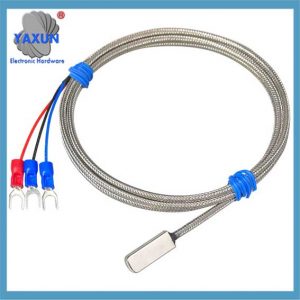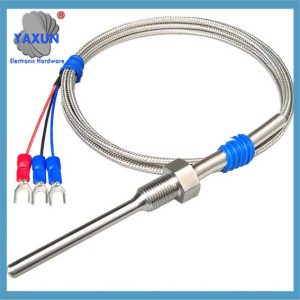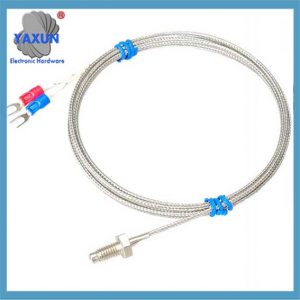颗粒炉是用于加热或锻烧固体颗粒的设备, 通常用于工业生产和实验室. 颗粒炉运行过程中, 温度传感器是非常重要的部件,用于测量炉内温度,保证炉内温度控制和稳定性.
对于颗粒炉, 选择合适的温度传感器非常关键. 根据颗粒炉的材质及使用要求, 常见类型的温度传感器包括热电偶和热敏电阻. 下面我们将分别介绍这两种传感器类型在颗粒炉中的应用.
热电偶是一种常用的温度传感器,基于两种不同金属之间的热电效应. 热电偶测量范围宽、稳定性好, 适用于高温环境下的温度测量. 颗粒炉通常需要测量更高的温度, 所以热电偶是常见的选择. 常见的热电偶类型包括K型, N型, 和S型, 可在不同温度范围内提供精确的温度测量.
除了热电偶之外, 热敏电阻也是常见的温度传感器, 根据材料电阻随温度变化的特性来测量温度. 在颗粒炉中, 常用的热敏电阻材料有铂电阻和镍电阻. 铂电阻测量精度高、稳定性好, 并且适用于较宽的温度范围. 镍电阻器适用于较低温度范围, 但他们的价格相对较低, 使其适用于一些经济要求较高的场合.
颗粒炉烤箱温度传感器
用于颗粒炉, 温度传感器的具体选择还需要考虑其他因素, 例如传感器尺寸, 响应时间, 抗干扰能力, ETC. 此外, 还需要考虑颗粒炉的具体工艺要求和监控系统的要求. 一般来说, 100k传感器更灵敏,可以检测更广的温度范围, 而50k传感器更加稳定可靠. 传感器的具体选择取决于颗粒炉的具体需求和设计要求.
简而言之, 颗粒炉通常需要测量更高的温度, 常见的温度传感器类型包括热电偶和热敏电阻. 温度传感器的具体选型需要综合考虑多种因素, 包括测量范围, 精度要求, 工艺要求, ETC. 建议在供应商或专业人士的指导下选择温度传感器.
 English
English Afrikaans
Afrikaans العربية
العربية বাংলা
বাংলা bosanski jezik
bosanski jezik Български
Български Català
Català 粤语
粤语 中文(简体)
中文(简体) 中文(漢字)
中文(漢字) Hrvatski
Hrvatski Čeština
Čeština Nederlands
Nederlands Eesti keel
Eesti keel Suomi
Suomi Français
Français Deutsch
Deutsch Ελληνικά
Ελληνικά हिन्दी; हिंदी
हिन्दी; हिंदी Magyar
Magyar Bahasa Indonesia
Bahasa Indonesia Italiano
Italiano 日本語
日本語 한국어
한국어 Latviešu valoda
Latviešu valoda Lietuvių kalba
Lietuvių kalba македонски јазик
македонски јазик Bahasa Melayu
Bahasa Melayu Norsk
Norsk پارسی
پارسی Polski
Polski Português
Português Română
Română Русский
Русский Cрпски језик
Cрпски језик Slovenčina
Slovenčina Slovenščina
Slovenščina Español
Español Svenska
Svenska ภาษาไทย
ภาษาไทย Türkçe
Türkçe Українська
Українська اردو
اردو Tiếng Việt
Tiếng Việt



